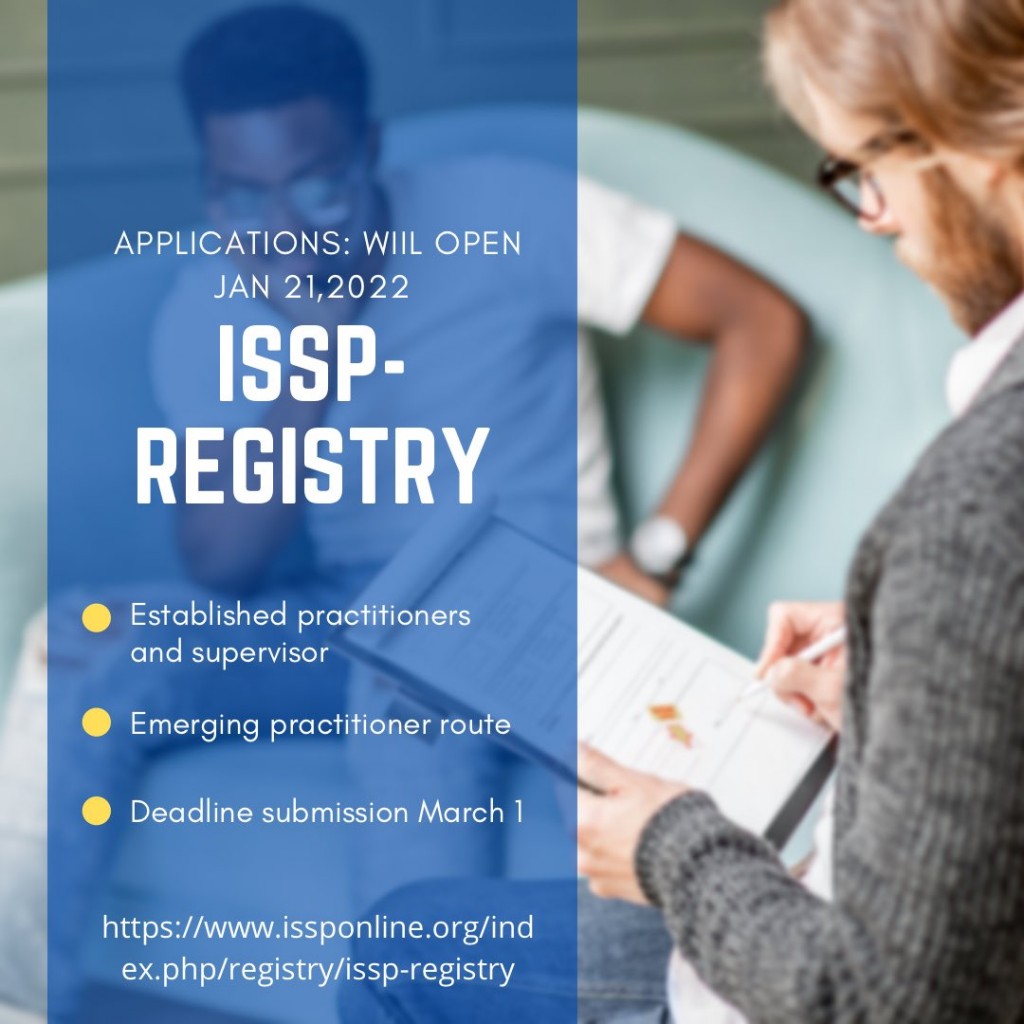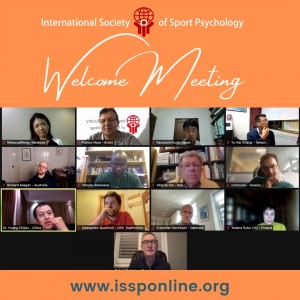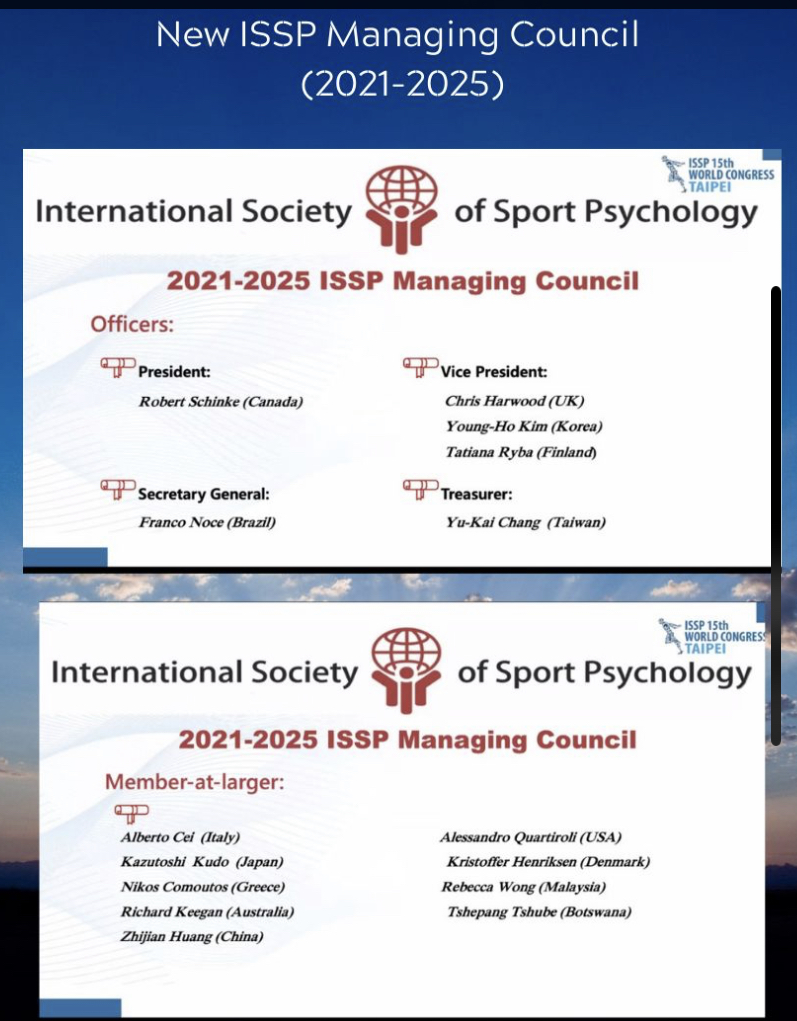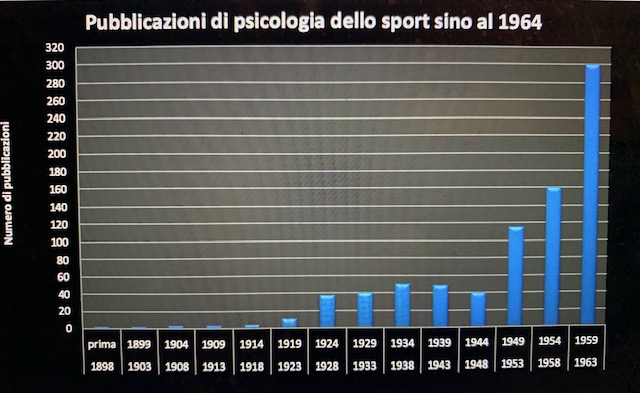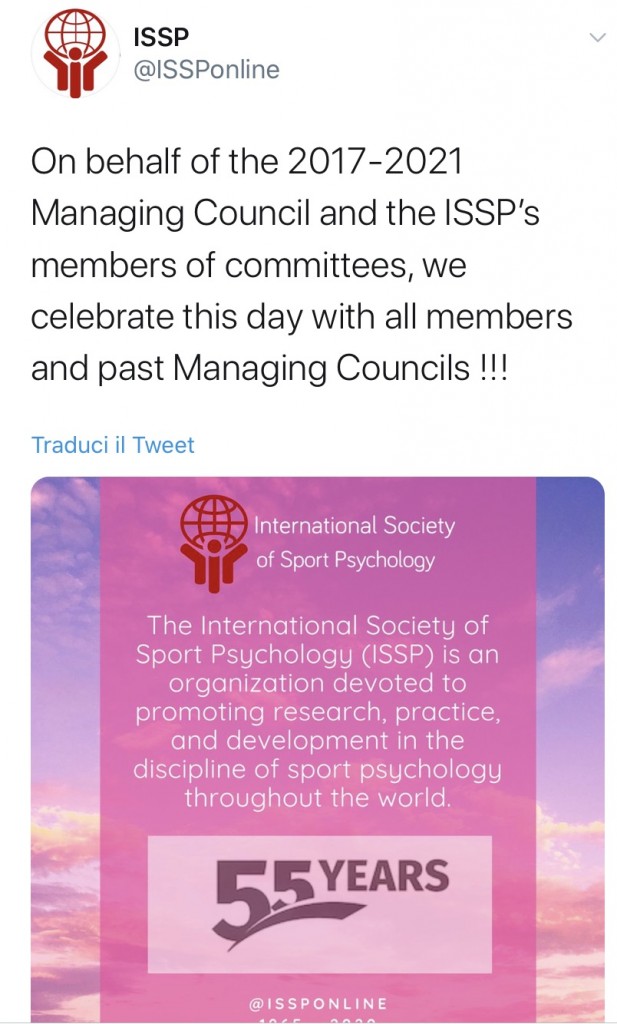ISSP is pleased to announce that applications to the ISSP-Registry (ISSP-R) and ISSP-Registry of Approved Supervisors (ISSP-S) will be re-opening. Applications will open on Friday, January 21, 2022. Please refer to the ISSP-R section of the website for full details.
Tag Archive for 'ISSP'
Page 2 of 3
We held the International Society of Sport Psychology Welcome Meeting. The new ISSP MC introduced themselves and discussed the first issues involving the organization and some goals to be achieved in the next four years. #sportpsychology
Message of Franco Noce, new ISSP General Secretary
Very happy to have been elected Secretary General of the ISSP and to be the first South American to hold a position on the Executive Board. It will be a great responsibility to continue the exceptional work carried out by my predecessor (Dr Artur Poczwardowski) and I will act with excellence to live up to the trust placed in me.
For the retired management colleagues of 2017-2021, it was a great honor to work with each of you.
For new ones, welcome. It will be great to share the challenges and opportunities for the next 4 years together for the development of sport psychology around the world.
New MC Members at large (2021-2025): Alberto Cei (Italy), Kazutoshi Kudo (Japan), Richard Keegan (Australia), Zhijian Huang (China), Alessandro Quartioli (USA), Rebecca Wong (Malaysia), Tshepang Tshube (Botswana).
Chris Harwood Tatiana Ryba Nikos Comoutos former Zourbanos Kristoffer Henriksen Alberto Cei Alessandro Quartiroli Richard Keegan Rebecca WongTshepang Tshube PhD Kazutoshi Kudo
Retired MC members (2017-2021): Gangyan Si (Past President – China); Thomas Schack (Vice President – German); Artur Poczwardowski (Secretary General); Hiroshi Sekiya (Japan); and the members at large Athanasius Amasiatu (Nigeria), Daniel Gucciardi (Australia), Jolly Roy (India), Lauren Loberg (USA). Gangyan Si Thomas Schack Artur Poczwardowski Hiroshi Sekiya PROF. ATHAN AMASIATU Daniel Gucciardi Lauren Loberg, PhD Jolly Roy
Given the mission of International Society of Sport Psychology (ISSP) and in the spirit of globalization, internationalization, unification, and collaboration, ISSP has established an internationally recognized consultant/practitioner registry that represents the minimum standard of sport psychology practice. The ISSP-Registry (ISSP-R) aims to respond to the high international mobility of both sporting clients and consultants as well as increase the visibility and credibility of the profession internationally. Importantly, it aims to augment the professional standards of the field with a particular focus on supporting those countries in which applied sport psychology is at a developing phase.
Please visit the website here to read about the Emerging Practitioner Route to ISSP-R . This route is for early-career practitioners looking to demonstrate their educational and practical competence in the field. In addition to the minimum academic (i.e., BSc/BA, MSc) and supervised experience requirements, applicants will be required to engage and successfully pass three short ISSP-specific modules focused on cultural competence, ethics, and mental health.
ISSP and Society of Sport and Exercise Psychology of Taiwan (SSEPT) will be hosting the three ISSP-R modules for those sport psychology participants interested in taking them. We have invited three keynote speakers for the ISSP-R modules programme including Robert Schinke (current president of ISSP and a professor at Laurentian University), Gangyan Si (former president of ISSP and a sport psychologist at Hong Kong Sports Institute), and Chris Harwood (current accreditation chair of ISSP and a professor at Loughborough University).
Mark on your calendar the deadline to submit your abstracts before you miss it:
May 03, 2021!
Give yourself the best chance of being selected — get a jump-start by reviewing the submission guidelines.
Sport psychology has come a long way since the beginning of the 60′s, in the period 1959-1963 300 articles were published. We continue to think that it is a young discipline but it would be better to start thinking that on the contrary it is a part of psychology now well established and internally very differentiated.
Suffice it to say that next to the classic distinction between sport psychology and exercise psychology, several other areas have emerged as it was already highlighted by Robert Singer in the introductory report to the ISSP World Congress in Lisbon in 1993.
On the other hand there are at least 10 journals of sport psychology and every year dozens of books on sport psychology are published worldwide.
Sport psychology enjoys good health and now offers the same opportunities that it can be found in other areas of psychology. It is also highly regarded by athletes and coaches who understand its function.
So my dear Sports Psychology I wish you a prosperous 2021!
We are pleased to announce that the abstract submission for the ISSP 15th World Congress is now open! The congress will be held in Taipei from September 30 to October 04, 2021. Please visit https://issp2021.com/Page/Submission%20Guideline
For any questions, please email: issp2021.reg@elitepco.com.tw
This year is the 51st year since the International Journal of Sport Psychology (IJSP) was founded in 1970. We will publish two special issues, the first has a look back at the history of sport psychology and second look at the future perspective. Guest editors: Sidonio Serpa, Fabio Lucidi and Alberto Cei.
This journal was the very first dedicated specifically to sport psychology, and it was created almost 10 years before the Journal of Sport Psychology that was published for the first time only in 1979. I have heard many criticisms of the Journal, as it was called by Antonelli, being the editor together with John Salmela from 1988 to 1995. However, few people remember the many difficulties involved in its founding and development, how no publisher was willing to accept the burden of publishing a scientific journal for world-wide diffusion. Only when the Journal finally became well-known and become successful did some of the main publishing firms show interest in purchasing it. Initially the IJSP was supposed to be published in Norway, directed by Alfred Morgan Olsen – Norwegian School of Sport (1969-1992) and ISSP vice-president – but problems arose with the publisher. In fact, Antonelli in the first issue wrote:
“The Managing Council appointed an Editorial Board (led by Olsen), and I, too, signed a contract with a Norwegian publisher. . .and I received a good number of subscriptions. Because of the problems that Dr Olsen refers to, I have found myself obliged to take on the position of Chief Editor and to find another publisher at all costs and without delay in order to start the journal. A journal that would inform all members … had become a necessity, a duty” (Antonelli, 1970, p. 3–4).
Antonelli found the person who would accept this challenge in his friend, the publisher Luigi Pozzi. Pozzi himself told me that when Antonelli proposed this enterprise just a few words were necessary to persuade him to accept. One can only agree with Salmela (1999), when he states that this was truly a heroic challenge, achieved only thanks to Antonelli’s solitary determination, without financial coverage:
“For $10 a year I am able to offer only two small, unassuming, issues, so there is another matter which I must reveal. When registration to the ISSP was free of charge, I received 1500 applications. When I asked for 10 dollars, not for the ISSP, that sustains no expenses and thus requires no money, but for the subscription, only 10% paid this fee. I have found a very understanding publisher, who has agreed to give up all his profit, and for this I publicly thank him from the bottom of my heart; but printing and mailing expenses are enormous. I will be able to print and send out the first issue with what I have received to date. And I will send it to all 1500 members. If necessary, I will then go ahead at my own expense … this is not an exhibition of crazy heroism … I am sure that when they receive this first issue, many members will pay the subscription fee for the second issue of 1970″ (Antonelli, 1970, p. 4–5).
Yesterday I wrote to Glyn Roberts in relation to the special issue of the International Journal of Psychology that we will publish this year to celebrate the 50th anniversary of this journal, born in 1970. These various events brought back memories to me when I first met Glyn and the other members of the International Society of Sport’s managing council. It was in Varna, Bulgaria, in 1987, I was 32 years old and at that time it was quite incredible for me to attend a meeting of the managing council, in place of Ferruccio Antonelli, who had not wanted to attend, to talk about the future of the Journal and above all to get some of them, Robert Singer, John Salmela, Lars Unestahl, Miroslav Vanek or Glyn Roberts to take over the its scientific responsibility. They were very friendly with me, as North Americans usually are, perhaps also for the reason they expected an old and formal person, a bit in Antonelli’s style. And so they were surprised when they met me. There was a lot of free time, spent playing tennis, running and walking. I had read the book by John Silva III and Robert Weinberg entitled “Psychological Foundations of Sport” and, therefore, I knew the chapters by John Salmela and Glyn Roberts to whom I never stopped asking questions about motivation rather than the origins of sports psychology and its role in North America.
Certainly very kind but nobody wanted to take responsibility for the Journal. They knew Antonelli and that it would be difficult to collaborate with him, given his history in the ISSP and also because it was his habit to publish all the articles that were sent to the Journal, without applying any form of review. I said that I was aware of this way of managing the journal but that alone I could never change this kind of approach and that, moreover, I did not have the competence to manage a scientific journal.
At the end of the discussion, John Salmela raised his hand, basically saying: “Okay, I’m willing to help the Journal, because in any case it represents the International Society of Sport Psychology”. His terms were that he and I would be the new co-editors, that Antonelli would withdraw and on this basis we would build the system to improve the scientific quality of the Journal. Things didn’t exactly go exactly that way, because Antonelli remained for some time in the role of editor-in-chief, he didn’t play any function but wanted to maintain the leadership in the eyes of the world. However, the system we put together worked and, in those years, the Journal grew in scientific quality. We worked a lot with John, spending a lot of time together in Canada, first in Montreal and then in Ottawa and in Italy, in Rome. We became friends and we saw each other every year for more than twenty years. Another meeting with the managing council was in Ottawa in 1992 (as in the picture below).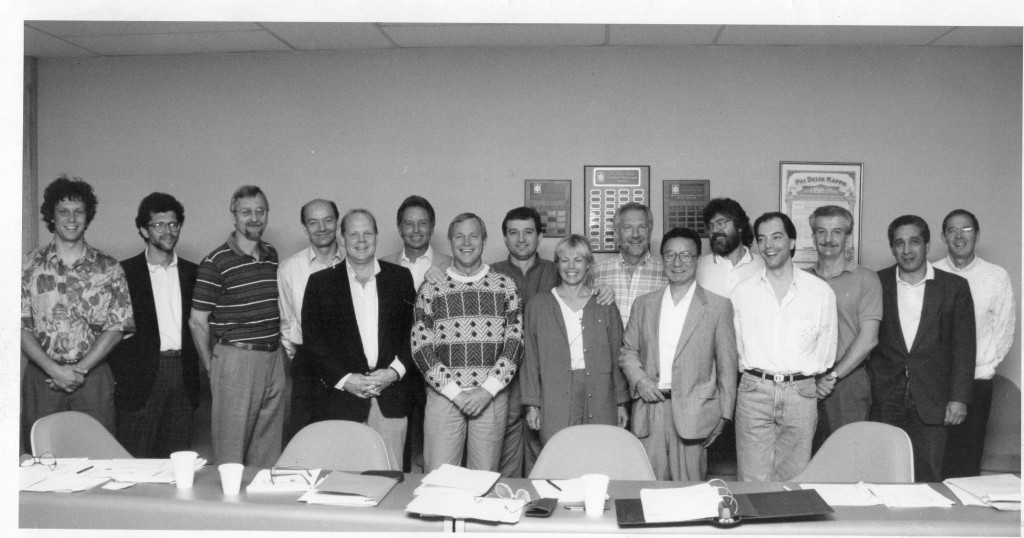
From left Pierre Trudel, Alberto Cei, Jurgen Nitsch, Gerd Konzag, John Salmela, Robert Singer, Denis Glencross, Gershon Tenenbaum, Marit Sorensen, Glyn Roberts, Atsushi Fujita, Semen Slobunov, Sidonio Serpa, Richard Magill, Carlos Moraes and Terry Orlick.
